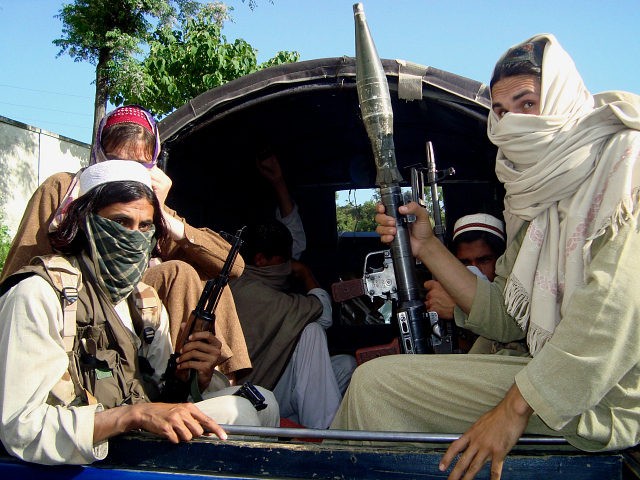U.S. President Donald Trump’s strategy to end the war in Afghanistan is “determined” to pressure the Taliban into reconciliation and a political settlement with the Kabul government by making the jihadists realize they cannot win, declared the top American commander in the war-ravaged country, echoing the State Department and the Pentagon.
Despite Afghan President Ashraf Ghani saying peace talks between the U.S.-backed Afghan government and the Taliban were within reach in early 2015, there has been no discernible progress in negotiations with the terrorist group, which has refused to participate in talks with Kabul because it is winning the war.
Nevertheless, the U.S. military, State, and the Pentagon as a whole have recently indicated that Trump’s new Afghanistan strategy is focused on bringing the Taliban to the negotiating table to discuss peace and reconciliation with the Afghan government.
“We are determined to pursue the goal of a political settlement. As these terrorist groups realize that they cannot win, they will see that their best option is to pursue peace,” American Gen. John Nicholson, the top commander of U.S. and NATO troops in Afghanistan, told reporters in Afghanistan during a joint press conference with the U.S. ambassador in the country.
Gen. Nicholson urged the Taliban to “stop fighting against your countrymen. Stop killing innocent civilians. Stop bringing hardship and misery to the Afghan people. Lay down your arms and join Afghan society. Help build a better future for this country and your own children.”
His remarks are consistent with how U.S. Secretary of State Rex Tillerson has described Trump’s newly unveiled Afghan strategy — as an effort to convince the Taliban to negotiate peace with the Afghan government.
“We are there to facilitate and ensure that there is a pathway for reconciliation and peace talks,” declared Tillerson. “As the pressure begins to take hold, we believe we already know there are certain moderate elements of the Taliban who we think will be ready and develop a way forward.”
Tillerson acknowledged that the negotiation effort would take time.
“It is time to begin a process, a lengthy process, of reconciliation and a peace accord in Afghanistan,” he proclaimed. “How long that will take will be based on conditions on the ground.”
Trump’s South Asia strategy is intended to pressure the Taliban to accept that they “will not win a battlefield victory,” also said the secretary of state, directly addressing the jihadists and saying, “We may not win one, but neither will you.”
The Pentagon recently indicated that Trump’s plan would push for a peace agreement with the Taliban.
“Our main objective is to prevent Afghanistan from being used as a safe haven for terrorists to attack the United States and our allies,” Adam Stump, a Pentagon spokesman, recently told Breitbart News. “The United States will support the Afghan government and security forces in their fight against Taliban, al-Qaeda, ISIS [Islamic State], and other insurgents and prevent re-establishment of international terrorist safe havens in the country. We will maintain pressure on the Taliban to join a peace process with the Afghan government to end the war in Afghanistan.”
Taliban jihadists are believed to control or contest about 40 percent of Afghanistan, according to a watchdog agency.
Nevertheless, Gen. Nicholson argued that peace negotiations are in the best interest of the Taliban.
“In the rank and file, the Taliban’s losses are even greater than the losses of the Afghan Security Forces. This is unsustainable. The Taliban are a criminal organization, more interested in the profits they find in drugs, kidnapping, and murder for hire than offering anything better to the Afghan people,” he said.
The U.S.-backed Afghanistan Peace and Reintegration Program (APRP), considered the only institutional mechanism within the Afghan government with the capability to pursue both high-level reconciliation negotiations and provincial-level reintegration of terrorists, closed its doors last year due to a lack of progress, despite the tens of millions the United States wasted on the effort.
Between the program’s creation in 2010 and 2014, over 9,000 terrorists were reintegrated into Afghan society, at a cost of about $35,000 each, with the United States bearing most of the burden.
Currently, the Trump administration is preparing to launch a successor to the APRP — a five-year Afghanistan National Peace and Reconciliation (ANPR) strategy, reported the U.S. Special Inspector General for Afghanistan Reconstruction (SIGAR), a watchdog agency.
“According to [the] State [Department], the ANPR is expected to shift from the disarmament, demobilization, and reintegration focus of the APRP to negotiating political settlements with armed opposition groups, forging national and international consensus on a peace process, and promoting and institutionalizing a culture of peace,” explained SIGAR.
In announcing his Afghan strategy Monday, President Trump promised a military “victory” to the American people.
“We will fight to win. From now on, victory will have a clear definition: attacking our enemies, obliterating ISIS, crushing al Qaeda, preventing the Taliban from taking over Afghanistan, and stopping mass terror attacks against America before they emerge,” said the president.
“We are not nation-building again,” he added. “We are killing terrorists.”
The United States has invested about $714 billion in Afghanistan since the war started in October 2001, including an estimated $120 billion on reconstruction efforts alone, dubbed “nation-building” by some critics.
Nicholson “rejected criticism that the new military strategy would echo previous U.S. policies that did not make significant headway, even with more than 100,000 foreign troops in Afghanistan at one time,” reports the Washington Post (WaPo).
He praised the shift from U.S. strategy of support based on “arbitrary timelines” to one “guided by conditions” on the ground, noting, “You can believe it will be different because we removed the calendar from the equation.”
The U.S. military and the Trump administration have been silent about how many additional American troops will deploy to Afghanistan as part of the new strategy.

COMMENTS
Please let us know if you're having issues with commenting.